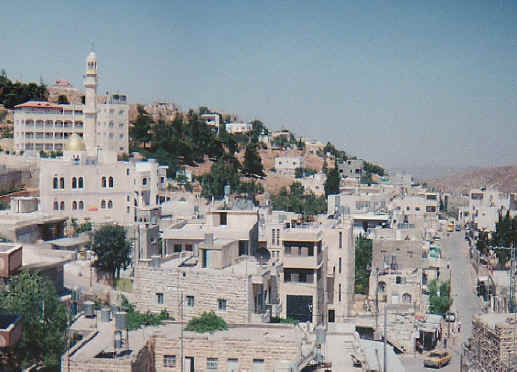A month or two before, just after his company had moved into its base (which is known as the 773 Outpost, because it sits 773 meters above sea level), reports came in that stones were being hurled at night from a nearby hill at settlers’ cars traveling on the 60 Road. Omer sent a squad of camouflaged snipers out to investigate, and one night, using special optics, they caught a twenty-year-old Palestinian man from the village of Sinjil in the act. They shot him just below the knee with a high-powered rifle. Oddly enough, Omer was standing by with a military doctor, and five minutes after being shot the man was being treated by the same army that had just maimed him. An Israeli ambulance took him to a hospital in Jerusalem, where the government paid for his treatment. Part of the man’s leg had to be amputated, but the point was that he was alive, and could serve as a living warning. “Every day now his village will remember what happened,” Omer said.
I asked Omer whether it had been necessary to shoot the man at all. Couldn’t the soldiers simply have arrested him, or given him a stern warning? Omer found my questions puzzling. From his point of view, he had acted with restraint, because “legally we could have shot him?to kill.” Omer argued that the man’s actions posed a lethal hazard to those riding on the 60 Road; people could have been killed. In fact, as Omer reminded me, in March of 2002, not far from where we were standing, a Palestinian sniper had opened fire on a 60 Road checkpoint known as British Police (after those who built it), killing seven Israeli soldiers and three civilians with an ancient rifle. The sniper had never been caught. British Police, which was near a stand of tall pines, was now abandoned, but the incident, like so many others in this part of the world, was far from forgotten.
At dusk one evening I went out with Omer and two of his men on a patrol of two Arab villages near ?the base, Sinjil and Jiljilya. Omer drove the Storm, a special armored Jeep with bulletproof windows and flatproof tires. The narrow road on which we were driving, much of it dirt, wound its way up a hill and past the simple whitewashed houses of Sinjil, the first village, where a soldier pointed out to me a wall on which a map of Israel and the West Bank had been painted?the whole of it filled in with the green, black, and white stripes of the Palestinian flag. For the soldiers this was unmistakable evidence of the Palestinians’ refusal to accept Israel’s right to exist, and a clear sign that we were in enemy territory.
None of the soldiers had told me what to expect, so the flying rock took me totally by surprise. With a bang it bounced off the roof of the Storm and skittered across the hood, making me jump. We had left Sinjil, traveled maybe two miles across an arid, vacant hillside, and were just coming into Jiljilya. I looked through the Storm’s thick windows to see where the rock had come from, but nobody was in sight. On either side of the road, however, were the remains of a makeshift barricade that had been constructed by locals; once it had spanned the road, but now it was a ruin of rocks, boxes, chairs, and a television. “I think we won’t go all the way in tonight,” Omer said, turning the car around at the other end of the village.
Only later did I learn that Omer considered it unsafe to proceed with only one truck. That was the next evening, after I had asked whether we might go back and drive in farther. Though he couldn’t come himself, Omer okayed the trip, sending me out in the Storm with Adam, an experienced driver, and Rooey, a radioman. We were followed by other soldiers in a Humvee driven by a young woman who, like about a quarter of Omer’s troops, was an immigrant from Russia. The soldiers chatted to one another and to the base on their radios.
The chatter stopped when the first stone struck the Storm with a bang?once again we were passing the scattered remnants of the barricade in Jiljilya. I jumped, but Adam drove on, smiling ruefully. “Even for us the first one is always a little scary,” he said. “The first one?” I said.
Then two more stones hit the Storm, while others flew by, barely missing us. This time I saw where they were coming from?a bunch of kids behind a wall. But the soldiers ignored them, and we drove on to a third village, Abwein.
In Abwein, five minutes later, I heard a loud, shrill whistling for the first time?the signal Palestinians use to communicate that army vehicles are on the way. Another round of stones rained down on us, but our two-vehicle motorcade kept moving, neither speeding up nor slowing down, and Adam’s face was expressionless.
“Why are we here, exactly?” I asked him.
“Just to show them we are here,” he said, smiling darkly. In other words, I thought to myself, intimidation.
Soon we reached the end of the road?the army had placed a big earthen mound across it. Such strategically placed road closures (as opposed to checkpoints) are common all over the West Bank; the army uses them to restrict access to roads favored by settlers, and to increase its control over Palestinian districts like this one. We started turning around, which took a long time on the narrow street, especially for the Humvee. “You mean we have to go back the way we came?” I asked. Adam thought this question was funny.




Post Your Comment
*It should be NOTED that your email address won't be shared, and all communications between members will be routed via the website's mail server.